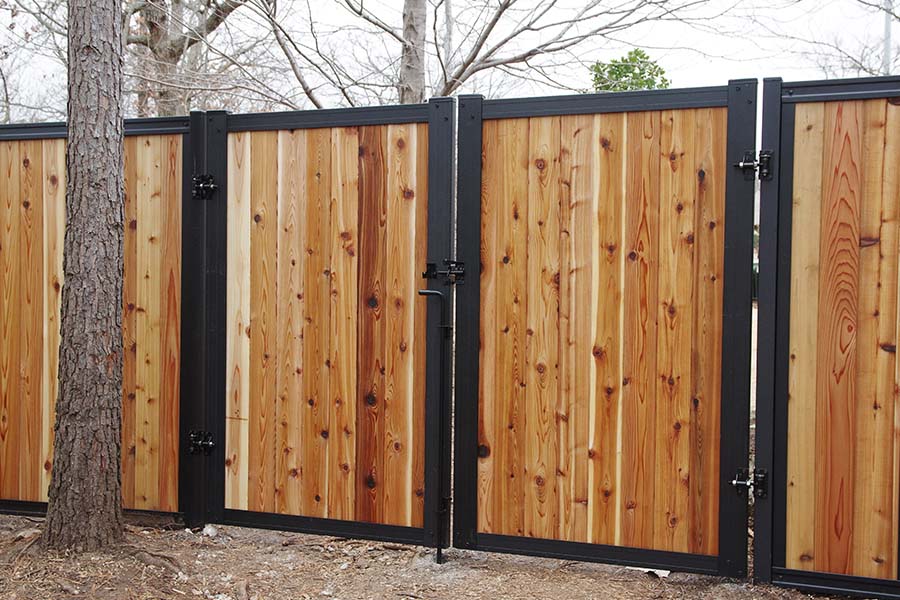All Categories
Featured

Choosing the appropriate sort of fencing for your residential property is a significant choice that can affect both the aesthetic appeals and performance of your space. Whether you're trying to find privacy, protection, or just an ornamental feature, there are various aspects to consider when selecting the excellent fencing. Below are some vital factors to consider to help lead your decision-making process.
- Identify the Function of the Fence. The very first step in choosing the best type of fence is to clarify its function. Various fences offer various functions, and recognizing your details requirements will help narrow down your alternatives. Consider the following:
Personal privacy: If you're seeking privacy, a tall and strong fence such as timber or vinyl will avoid prying eyes from seeing right into your lawn. Safety and security: For security purposes, a strong, tall fencing constructed from light weight aluminum or steel can deter burglars and give peace of mind. Aesthetic Appeal: An ornamental fencing made from functioned iron, light weight aluminum, or picket-style timber can add beauty and visual allure to your residential or commercial property. Animal or Pet Containment: If you need to consist of pets or animals, a tough fencing like chain link or wood may be needed to stop them from escaping. 2. Take into consideration the Product. As soon as you have actually developed the fencing's key function, it's time to select the material. Each sort of material comes with its own set of benefits and obstacles. Here are some common products to think about:
Timber: Wood fencings are personalized and flexible, supplying privacy and a classic appearance. They're excellent for typical homes or rural buildings yet call for routine maintenance to avoid bug, bending, or rot problem. Plastic: Vinyl fencings are low-maintenance, durable, and available in a range of designs. They will not split, warp, or discolor, making them a great option for those that want a long-lasting, hassle-free fencing. Plastic can be more expensive ahead of time than wood. Light weight aluminum: Light weight aluminum fencings provide a streamlined, modern-day appearance and are long lasting, rust-resistant, and call for marginal maintenance. They usually do not use as much privacy as timber or plastic, as the slats are commonly spaced apart. Chain Link: Chain link fences are typically made use of for security or to have pets. They are affordable and resilient, yet they do not offer much privacy or aesthetic charm unless you add slats or privacy displays. 3. Consider the Climate and Maintenance Requirements. Your region's climate can dramatically affect the life expectancy and upkeep demands of your fence. Products like wood might need added care to prevent rot or mold development if you live in a location with high moisture or frequent rainfall. On the various other hand, plastic and light weight aluminum fences are resistant to the aspects and call for a lot less upkeep.
Additionally, think about the quantity of time and initiative you agree to devote to fencing maintenance. Wood fencings need regular staining or paint to preserve their appearance, while plastic and aluminum call for far less upkeep.
- Think of Resilience and Life-span. Think about for how long you want your fencing to last. If you're searching for a fence that will last for decades with little upkeep, plastic and light weight aluminum are exceptional selections. While timber fencings can last 10-20 years with appropriate treatment, they may not withstand the test of time along with other materials.
Also, consider your budget. Materials like timber and chain web link tend to be more economical upfront, while vinyl and light weight aluminum have a tendency to find with a higher first price yet offer long-lasting longevity.
- Match the Fencing to Your Residential Or Commercial Property Style. The type of fence you select ought to complement the general look and feel of your residential or commercial property. An appropriate fence can improve your home's curb appeal, while an inadequately selected fence can diminish it. For circumstances:
Typical Residences: A timeless timber picket fencing or a functioned iron fence works well with older, extra conventional homes. Modern Homes: For a modern look, streamlined materials like light weight aluminum or plastic can enhance modern-day architecture. Country or Farm Features: A wooden or cord fencing may be optimal for rural buildings or farms, where practicality is simply as crucial as appearances. 6. Examine Neighborhood Rules and HOA Standards. Before making your final choice, inspect your neighborhood zoning laws and any HOA (Homeowners Association) standards to guarantee that your desired fence adhere to elevation limitations, material requirements, and various other local regulations. Some locations have details regulations about the look of fences, particularly in domestic communities.

Verdict. Selecting the right fence for your building calls for mindful factor to consider of your requirements, budget, and the style of your home. Whether you're prioritizing personal privacy, safety and security, or visual appeal, there's a fencing product and design that will fit your demands. By taking into consideration the factors described over, you can make an informed choice and select a fencing that will improve the capability and charm of your property for many years ahead.
Latest Posts
Check Out the Top Auto Repair Offers in Montclare, Chicago
Published May 26, 25
1 min read
Uncover Leading Vehicle Maintenance Services offered by Montclare Auto Repair – Expert Care for Your Vehicle
Published May 25, 25
1 min read
Professional Residential Roofing Solutions You Can Depend On
Published May 24, 25
1 min read
More
Latest Posts
Check Out the Top Auto Repair Offers in Montclare, Chicago
Published May 26, 25
1 min read
Uncover Leading Vehicle Maintenance Services offered by Montclare Auto Repair – Expert Care for Your Vehicle
Published May 25, 25
1 min read
Professional Residential Roofing Solutions You Can Depend On
Published May 24, 25
1 min read